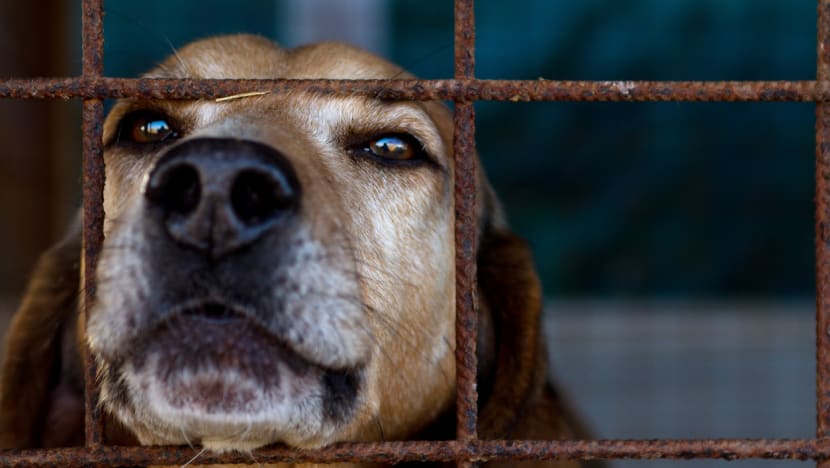Commentary: What should you do if you suspect your neighbour is neglecting their pet?
Signs of pet neglect can go unnoticed by neighbours and friends, but animals can’t speak for themselves and must rely on us to help, says Aarthi Sankar of SPCA Singapore.


This audio is generated by an AI tool.
SINGAPORE: Imagine that you hear your neighbour’s dog whining loudly for hours on end. Or you see a pet cat caged up for days in the common corridor. What would you do - speak to your neighbour, or report it to the authorities?
A significant legal precedent was set in April when a man received a 20-day jail sentence for neglecting 43 cats in a flat devoid of food and water. This was the first time a jail sentence was imposed for a conviction related to neglect, under Singapore’s Animals and Birds Act.
In 2023 alone, the SPCA investigated 915 cases involving animal welfare. These cases generally fall into two broad categories: Abuse and cruelty, where there is intentional infliction of pain, suffering, or death; and neglect, characterised by a failure to provide basic needs for an animal, resulting in prolonged suffering due to inadequate living conditions.
Alarmingly, more than two-thirds of the cases reported to the SPCA last year involved issues of neglect.
There are many reasons why animals end up neglected. Some people lose interest in their pets; a once-beloved puppy that captivated everyone’s attention becomes a dog that no one wants to care for. Additionally, there are individuals who fail to sterilise their pets, resulting in more animals than they can manage.
In other cases, psychological issues lead people to compulsively hoard pets, eventually overwhelming their ability to provide proper care.
It is heartbreaking that in all these situations, the animals are the ones who suffer the most.
CHALLENGING TO IDENTIFY SIGNS OF NEGLECT
On the surface, neglect might appear less severe than overt acts of animal cruelty, but its impacts are profoundly distressing. Neglect leads to prolonged suffering and can result in permanent harm or even death.
Signs of animal neglect can go easily unnoticed since it may not always leave visible marks and animals cannot express their distress. Residents usually do not have the opportunity to enter someone else’s home to directly examine an animal's condition, making it difficult to detect when pets are not being properly cared for.
To spot signs of neglect, observers should look for indications such as pets kept in cramped, unsanitary conditions typical of hoarding situations, or confined in unsuitable housing like tiny cages or left on balconies for prolonged periods. These environments fail to provide necessary space or comfort, clearly signalling neglect.
Neglect may also manifest in pets lacking necessary medical attention, evident through visible untreated injuries or signs of distress, and improper weight management, where pets may appear to be underweight or overweight.
CONTEXT IS KEY WHEN DEALING WITH CASES OF NEGLECT
Often, animal neglect can indicate broader issues within a household, such as the neglect of other dependents like children or the elderly. It can also arise from a significant shift in financial or living conditions.
In other instances, a neighbour might be overwhelmed by personal challenges, such as illness or caring for a family member, which could affect their ability to care for their pet.
It is not uncommon for reports to surface about animals appearing in poor condition, only to discover upon further investigation that these pets are elderly, with owners diligently managing chronic health issues as best as they can under challenging circumstances.
While the instinct may be to immediately report such cases to the SPCA or authorities, there are situations where a more nuanced approach could be more beneficial.
If you feel safe and comfortable, initiate a supportive conversation with your neighbour or friend. This approach can often alleviate the situation more effectively and immediately for the animal.
Helping or sharing practical advice can lead to immediate and significant improvements in the animal's welfare. Sometimes, owners may simply lack the necessary resources or knowledge to provide proper care for their pets.
When it comes to posting on social media about suspected neglect, one must consider the potential impact on the animal's welfare. While it might seem like a quick way to raise awareness and prompt action, public shaming can have several negative consequences that may ultimately make the situation worse.
Public shaming can lead to increased stress and defensiveness from the pet owner. If they feel attacked or embarrassed, they may become less willing to accept help or advice, which can delay or even prevent improvements in the animal's care.
However, if repeated attempts to assist or communicate with your neighbour fail, or if they respond with hostility, it becomes necessary to escalate the matter to the authorities and the SPCA.
If you do decide to report a case, providing detailed information, including photographs or videos, can significantly expedite the investigation process. Although the SPCA does not have enforcement powers, we collaborate closely with authorities to gather as much evidence as possible and prioritise critical cases.
CHALLENGES IN ENFORCEMENT
Investigating animal neglect is challenging and can take a long time. The definition of "unnecessary pain and suffering", as outlined in the Animals and Birds Act, is often difficult to prove.
Since animals can't speak for themselves, they rely on humans to intervene and help. The authorities focus on helping pet owners improve rather than punishing them immediately, usually starting with a warning or a fine.
However, our responsibility towards animals goes beyond legal obligations; it is a duty rooted in kindness and empathy. When we choose to bring an animal into our lives, we must also embrace the lifelong responsibility of their care.
After all, how we treat the most vulnerable among us speaks volumes about who we are as a people.
Aarthi Sankar is Executive Director of SPCA Singapore.




















